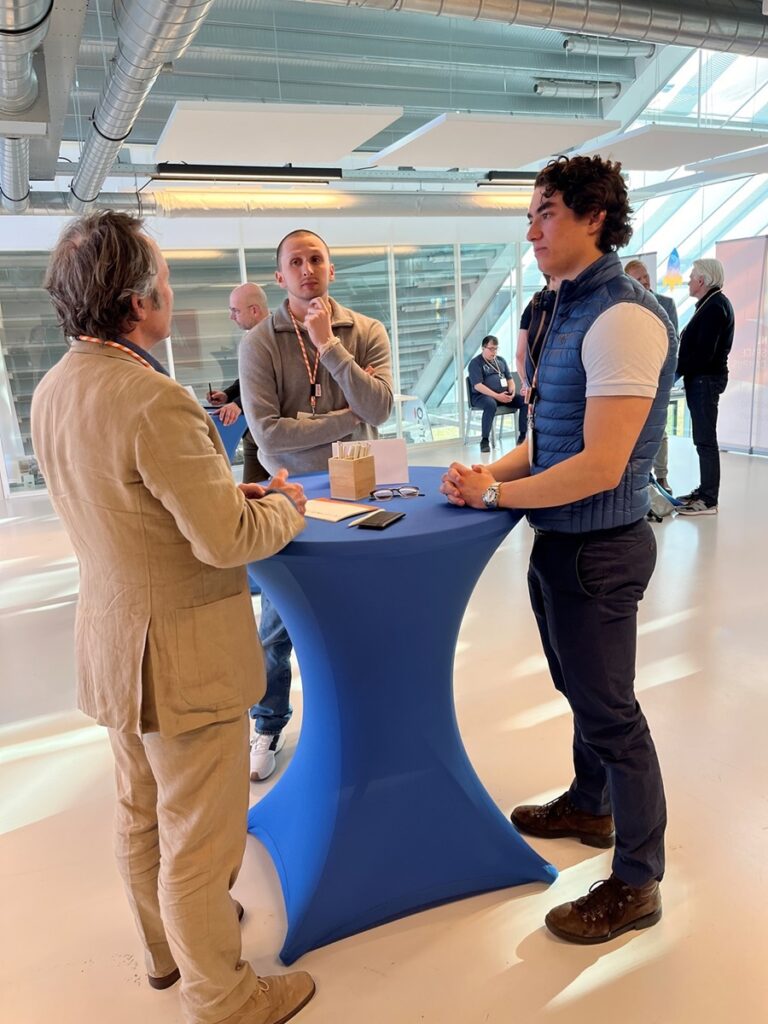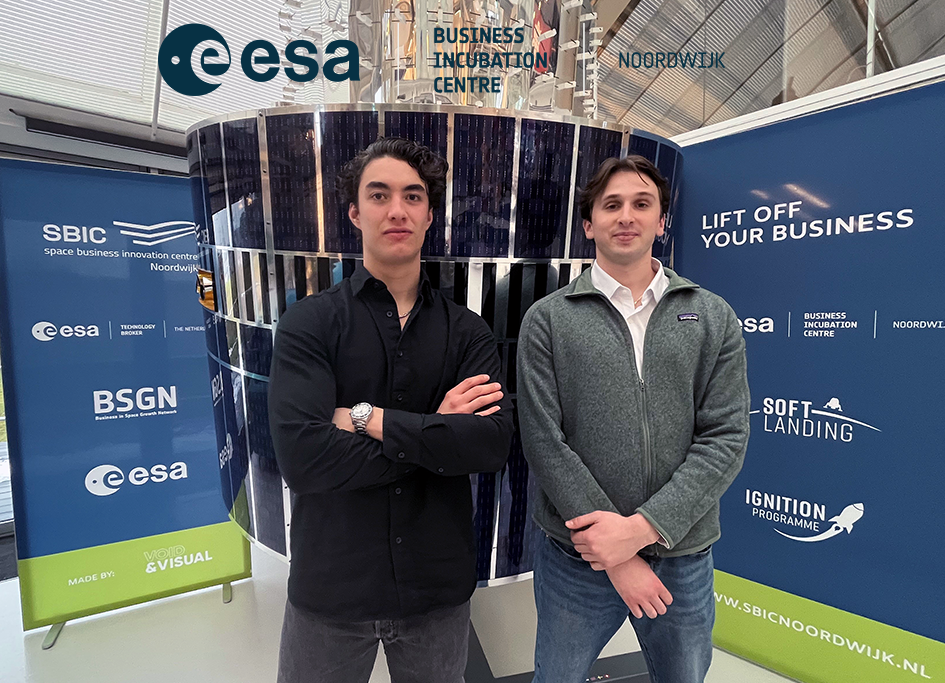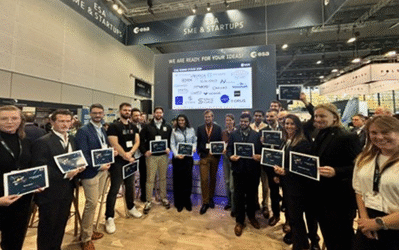Gravity Gardens is revolutionising the approach to agriculture and pushing the boundaries to develop innovative ways to grow crops. Participating in the Dutch business incubator of the European Space Agency (ESA BIC Noordwijk), the team is integrating advanced space tech into agriculture to enhance crop development. We caught up with founders Paulino Valdes (CEO) and Robin Le Vigouroux (COO) to find out how space tech has inspired their solution that is being applied to terrestrial food production.

When Paulino Valdes and Robin Le Vigouroux founded Gravity Gardens in 2024, they set out to explore the potential of their emerging technology and gain valuable validation. The startup is utilising space-derived tech for the agricultural industry and is propelled by the team’s ambition to change the way we grow food. From plant science to electrical engineering, mechanical engineering and embedded systems, Gravity Gardens has a diverse team that is uniting to transform farming.
Since joining ESA BIC Noordwijk in February 2025, the startup has been progressing its sustainable solution for the future of farming. Read on to hear from Paulino (P) and Robin (R) about their journey so far.
How do you describe the focus of your startup and what is the space link?
P & R: We’re developing a novel, space-inspired agricultural technology that increases crop yields using minimal land. We focus on scalability and simple integration to the current supply chain model. This technology leverages space principles, precision and optimisation, to create breakthroughs in terrestrial food production. Think of it as reimagining how food can be grown, with the potential to limit deforestation by increasing agricultural productivity.
What inspired you to establish your company?

P & R: Our startup is tackling humanity’s most urgent problem: feeding a growing population without continuing to destroy the planet. Agriculture, as we know it, has been around for 12,000 years and, while we’ve made it more efficient, the fundamental model hasn’t changed much. Nearly half of the world’s habitable land is now devoted to farming, land that was once virgin forests and thriving ecosystems. This is unsustainable. Our vision is to break that cycle.
Much like how the discovery of the wheel quietly reshaped the way people lived and moved, we believe our technology while still early has the potential to shift how we think about growing food. We’re not here to claim we have all the answers, but we’re building tools that we hope can contribute to both feeding people and healing the environment. It doesn’t have to be one or the other.
What is your background?
P: I have always been drawn to both nature and technology. From a young age, maybe around 14, I remember being determined to one day build something that could help improve the way agriculture works. This is not just in terms of efficiency, but for the planet and its animals as well. Years later, while studying mechanical engineering and working on a previous startup, I started developing a concept that was different – something that had the potential to reimagine farming from the ground up.
What is the expertise of the founding team?
R: Gravity Gardens began as a simple but ambitious idea – that the way we grow food can, and must, change. I came on board after reconnecting with Paulino, who I had met years earlier while he was studying in France. I studied bioresource engineering at McGill University in Canada and we both shared a deep love of plants and a strong interest in sustainable systems. Our skills and values aligned, and the partnership naturally took shape. Paulino is focusing on the technical and business side, while I am working on biological systems and research.

Get financial support (€60K funding) to help launch your space business >>
What have been your next steps?
P: We have grown Gravity Gardens step by step – building prototypes, forming a dedicated team, and spending countless hours inventing, testing and refining. The goal has always been the same. We are building a technology that is useful, scalable and something that can help communities most affected by the environmental and agricultural challenges we face today. Gravity Gardens is still early in its journey, but it’s grounded in a clear purpose – to use science and technology to support a healthier future for both the people and our planet.
How did you find out about the ESA BIC programme?
P: Our path to ESA BIC started when we were developing our initial prototype, which we intended to test in collaboration with the European Space Agency. During that time, we connected with space scientists and entrepreneurs – some of whom were building technologies for environments like Mars. Through those conversations, one person suggested we look into ESA BIC and after that we quickly realised it was the right environment for our project.
We had other options and considered several programmes but ESA BIC stood out as the best fit, in terms of technical support and the broader vision of fostering innovation with real-world impact.
What are you focusing on during incubation?
R: The main focus for us during the ESA BIC incubation programme is going-to-market. We’ve built two prototypes so far, and with the support and funding from the programme, we’re now developing our third version – one that’s significantly more efficient and much more aligned with the real needs of our potential clients.
P: Our goal during this phase is to start working with early customers, validate our offering in real-world conditions and begin generating initial revenue. We’re not expecting immediate profitability, but we do see this as the launchpad for real commercial traction and a strong foundation for future investment and growth.

What aspects of the programme do you find useful?
P: One of the most valuable parts of the ESA BIC programme for us is the coach pool. It gives us access to a panel of seasoned experts – CEOs, directors and specialists across a range of fields – who you can select based on your specific needs, whether it’s hardware development, software, supply chain or business strategy. As a founder, there are countless moments when you need advice, and having access to someone who’s been through the journey and can offer clear, experience-based guidance is incredibly important. Being able to build a meaningful connection with a mentor like that is, honestly, one of the most valuable things a startup can have.
R: The technical support, particularly the connection to ESA and space-industry professionals, is a huge advantage. We’re hoping to tap into that network to refine our technology even further with some of the brightest minds in the field.
P: And then there’s the community. Just being around other founders at different stages, working on bold ideas of their own – it creates a sense of momentum that’s really motivating. You can exchange advice, talk strategy or even just share the ups and downs. Knowing you’re not alone in the journey makes a massive difference. It’s one of the best parts of the whole experience.
If what you’re building has a meaningful link to space, then the ESA BIC programme is one of the best places to be
paulino valdes
Would you encourage entrepreneurs to apply to ESA BIC?
P: If you’re serious about what you’re building, especially if there’s a meaningful link to space or space-enabled technology, then ESA BIC is one of the best places to be. The resources, mentorship and network available here can make a huge difference in the early stages of your company. If you’re ready to move forward, to build something that actually matters – what are you waiting for? This programme can give you the support and momentum you need to take that next step.
And finally, what’s your favourite thing about space?
R: What excites me the most about space is the profound extent of what remains unknown and, yet, the courage with which we pursue it. Similar to the great explorers who once braved the oceans of our world.
P: I want to build the first moon hotel. [Editor’s note: Maybe worth keeping in touch with SBIC’s coach and ESA BIC alumnus Max Beaumont and his Atlantis Space City.]

ABOUT: Gravity Gardens is an agritech startup using simulated outer planetary environments to enable vertical farming of previously challenging crops, aiming to free up extensive land for sustainable uses. The team, led by Paulino Valdes (CEO) and Robin Le Vigouroux (COO), is revolutionising the approach to agriculture and pushing the boundaries to develop innovative ways to grow crops. The startup’s mission is to blend cutting-edge technology with sustainable practices to create efficient agricultural solutions, reduce vulnerability to environmental stressors, improve yields and lower input costs. gravity-gardens.com
Validate your business plan and space connection!
Refine and validate your space business idea via the space connection assessment takes place as part of your preparation of applying to ESA BIC. Want to find out more? Meet the team & get your questions answered:


